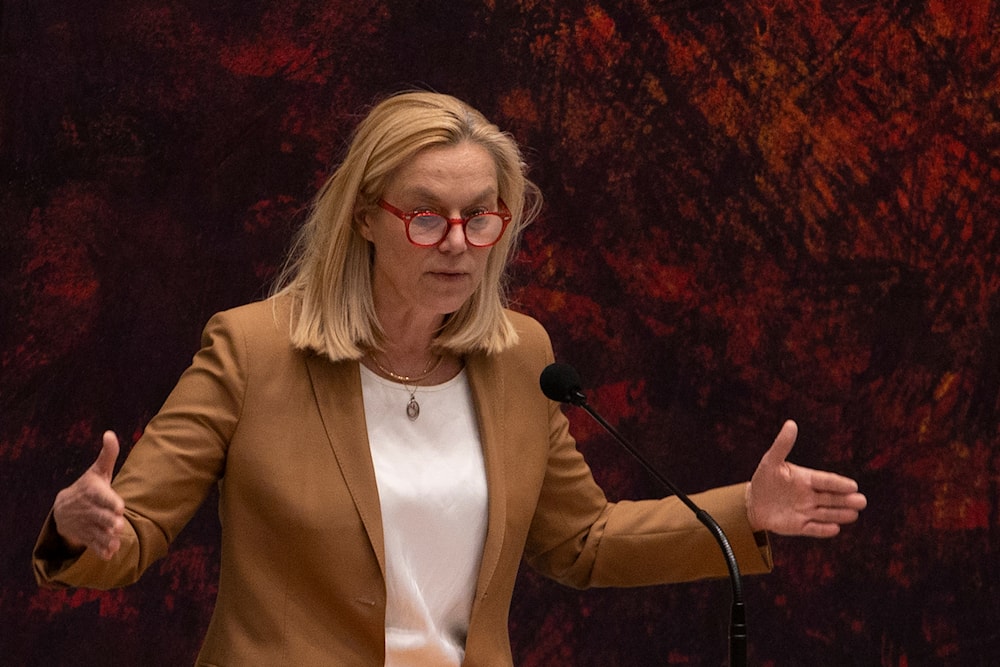'Essence of our common humanity is at stake': UN official warns
The UN called on the global community to act urgently to prevent further disaster in Gaza, stressing that "the essence of our common humanity is at stake."
-

Sigrid Kaag, leader of the centrist D66 party that finished second in elections last month, right, gestures during a debate in parliament in The Hague, Netherlands, early on April 2, 2021. (AP)
On Monday, the United Nations called on the global community to take immediate action to prevent further catastrophe in Gaza, emphasizing that "the essence of our common humanity is at stake," Anadolu Agency reported.
During a session of the UN Security Council, Sigrid Kaag, the senior humanitarian and reconstruction coordinator for Gaza, described the situation as a grave and sobering reality. She underscored the international community's significant responsibility in addressing the ongoing war.
Kaag pointed out the severe impact on Gaza's infrastructure and its people, noting that "the already fragile health infrastructure has been further devastated." She highlighted the critical issue of over 625,000 children who are still out of school, stating that their futures are overshadowed by "trauma, loss, and deprivation."
She reiterated the urgent need for a ceasefire, the unconditional release of captives, and unrestricted humanitarian access, emphasizing that immediate political resolve is essential to address these pressing concerns. "Time is slipping away as a man-made humanitarian crisis has turned Gaza into the abyss," she said, noting that the lack of effective protection for civilians is "unconscionable."
Stressing the need to ensure "unimpeded and safe access" for aid workers to reach those in need, Kaag said, "The polio campaign shows that, even in the direst circumstances, with sufficient political will, and real-time political commitment, humanitarian action is possible."
She noted the "vital role" of the UN agency for Palestinian refugees (UNRWA), describing it as a "critical, trusted partner in the social fabric of Gaza and as the backbone of the humanitarian operations."
Kaag asserted that without a stronger political commitment, current efforts are inadequate. "Existing systems alone cannot replace the political will necessary to reach civilians and address their needs. Systems alone do not save lives or restore dignity to those who have lost everything," she said.
The UN remains resolute in its commitment to stay and deliver support for the people of Gaza.
UNRWA’s vital role in Gaza’s humanitarian operations
With winter approaching, Kaag urged member states to assist the more than 14,000 patients needing treatment outside Gaza. She also reiterated the urgent need for a comprehensive solution to address the situation effectively.
"Humanitarian assistance is only a temporary pathway to alleviate suffering. A comprehensive, just, and lasting peace in the Middle East can only be realized through a two-state solution," she said.
Without political action, Kaag warned that "the cycle of suffering will continue" in Gaza.
Jorge Moreira da Silva, the head of the UN Office for Project Services (UNOPS), highlighted the worsening conditions in Gaza, stating, "We cannot overstate the difficulties of delivering humanitarian assistance in Gaza at this time. The design and implementation of the response mechanisms are critically important. We remain steadfast in our commitment to take action."
He detailed the mechanism set up to facilitate the distribution of humanitarian aid in Gaza, noting that 20 million tons of aid have been dispatched through this system, although Israeli authorities have obstructed some of it.
Da Silva also underscored the crucial role of UNRWA in distributing aid, reaffirming UNOPS' commitment to remain in Gaza, alongside other UN agencies, to continue their support efforts.
"Along with the rest of the UN family, UNOPS is determined to stay and deliver for the people of Gaza, both to respond to the immediate humanitarian needs and to support the immense recovery and reconstruction efforts that are so desperately needed," he said.
Despite a UN Security Council resolution calling for an immediate ceasefire, "Israel" has continued its severe offensive on Gaza since last October. According to local health authorities, the war has resulted in over 41,000 deaths, predominantly among women and children, and has left more than 95,000 injured.
The ongoing Israeli military campaign has displaced nearly the entire population of Gaza, compounded by a blockade that has led to critical shortages of food, clean water, and medicine. Additionally, "Israel" is facing allegations of genocide for its actions in Gaza, with such claims being examined at the International Court of Justice.

 4 Min Read
4 Min Read








